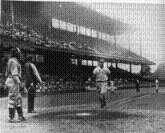We recently mentioned that Sports Law Blog will feature more guest bloggers. Over the next two months, you will be reading commentary from other professors and attorneys with backgrounds in sports. Two of them even played minor league baseball and were drafted (unlike, say,
a certain governor from New Mexico). We will still be posting, but we want to add new voices to the discussion.
Among those who will be blogging (in alphabetical order):
Christopher Callanan, Esq.Shareholder in the Boston office of Campbell Campbell Edwards & Conroy. Extensive experience in sports law, especially in licensing and endorsement deals. Also was a member of the trial team for a former NFL owner in a multimillion dollar antitrust suit against the NFL.
Timothy Epstein, Esq.Associate at SmithAmundsen in Chicago. Practices sports law and author of a recent law review article in the
Virginia Sports and Entertainment Law Journal.
David Frank, Esq.News Editor of
Massachusetts Lawyers Weekly and Co-Host of Sports Court on Sporting News Radio 1510 AM The Zone Boston. Formerly an assistant district attorney in the gang unit in the Suffolk County (Massachusetts) District Attorney's Office.
Scott Gilefsky, Esq.Senior Tax Manager of Ernest Young in Boston and Co-Host of Sports Court on Sporting News Radio 1510 AM The Zone Boston. Scott also teaches state and local taxation at Suffolk University's Sawyer School of Management. Formerly a guest lecturer on taxation at Northeastern University.
Chad McEvoy, Ed.D.Assistant Professor of Sports Management at Illinois State University. Expertise includes analysis of revenue production in collegiate and professional sports and fund raising in intercollegiate athletics.
Alan C. Milstein, Esq.Partner at Sherman, Silverstein, Kohl, Podolsky & Rose. Counsel for Maurice Clarett in
Clarett v. NFL. A nationally-recognized litigator in the fields of bioethics, sports law, food and drug law, products liability, and insurance law.
John Parsons, M.S., ATC.Assistant Professor of Sports Health Care at the Arizona School of Health Sciences. A licensed athletic trainer, his expertise includes the impact of information and computer technology on sports medicine.
John Powers, Esq.Associate at the Henderson Law Firm in Phoenix.
Played professional baseball in the San Diego Padres, Chicago Cubs, and Texas Rangers organizations.
Ryan M. Rodenberg, Esq.Associate General Counsel of Octagon Marketing & Athletic Representation (McLean, Virginia office). Author of an age-eligibility article in the
Sports Law Journal concerning women's professional tennis.
Joe Rosen, Esq. Andre L. Smith, Esq.Assistant Professor of Law at the Florida International University College of Law, where he teaches sports law and tax law. Previously was the Deputy Chief Operating Officer of the NAACP National Voter Fund, and Research Director (African American Outreach) for the Democratic National Committee.
Jeffrey Standen, Esq.Professor of Law at Willamette University College of Law, where he teaches teaches Criminal Procedure, Corporate and White Collar Crime, Remedies, Evidence, and Economic Analysis of Law. He previously served as a Deputy General Counsel to the U.S. Sentencing Commission. Faculty coordinator for
Future of Sports Law Syompsium hosted by the
Willamette Law Review (March 2006).
Scott Townsend, Esq.Associate at Young and Brooks in Houston. Commentator on Houston sports on his blog,
H-Town Sports.
Travis Tygart, Esq.Jennifer Wieland, Esq.Associate at Blackwell Sanders Peper Martin in Kansas City, and previously an associate in the Costa Mesa office of Latham & Watkins. While a student at the University of Virginia School of Law, Jenni was--amazingly--Executive Editor of both the
Virginia Law Review and the
Virginia Sports and Entertainment Law Journal. Jeff Wieland, a teacher, Eagles fan, and devoted husband and father, will be co-blogging.
Jeffrey A. Williams, Esq.Associate at Milbank Tweed Hadley & McCloy in New York City, where he works primarily on mergers, acquisitions and other aspects of corporate governance. Before joining the firm, he wrote often at Columbia Law School, producing one student note as well as the seeds of his article
Flagrant Foul: Racism in 'The Ron Artest Fight,' 13 UCLA Ent. L. Rev 55 (2005) and a third piece which will appear in a future edition of the University of Pennsylvania Journal of Constitutional Law. In addition to sports as a theatre for these topics, his other work likewise examines the critical interaction of traits like race, gender and sexuality in law and culture.
Each week, we will feature one or two guest bloggers. It should be exciting. Joe Rosen leads off.
--Michael McCann and Greg Skidmore
 If you have $6.9 million to spare, you can buy Manny Ramirez's Ritz Towers' penthouse in Boston. It is 4,500 squre feet, with six bathrooms and four bedrooms, and it has unobstructed views of the Public Garden, The Boston Common, The Charles River, Boston's Back Bay, and the Waterfront. Be sure to check out the virtual tour. I'm not sure if Ramirez is moving to another place in Boston, or if he is simply preparing for a possible off-season trade (Angels? Mets?), but it's a little bit nicer than what most of my Boston lawyer friends seem to have.
If you have $6.9 million to spare, you can buy Manny Ramirez's Ritz Towers' penthouse in Boston. It is 4,500 squre feet, with six bathrooms and four bedrooms, and it has unobstructed views of the Public Garden, The Boston Common, The Charles River, Boston's Back Bay, and the Waterfront. Be sure to check out the virtual tour. I'm not sure if Ramirez is moving to another place in Boston, or if he is simply preparing for a possible off-season trade (Angels? Mets?), but it's a little bit nicer than what most of my Boston lawyer friends seem to have.

















